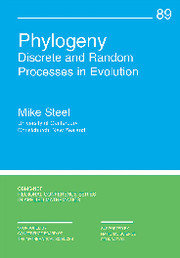Description
Phylogeny
Discrete and Random Processes in Evolution
CBMS-NSF Regional Conference Series in Applied Mathematics Series
Author: Steel Mike
This book addresses the underlying mathematical theory behind the reconstruction and analysis of phylogenies, and highlights the biological relevance of results.
Language: English
Subject for Phylogeny:
Publication date: 11-2016
308 p. · 17.2x25.1 cm · Paperback
Withdrawn from sale
308 p. · 17.2x25.1 cm · Paperback
Withdrawn from sale
Description
/li>Contents
/li>Biography
/li>
Phylogenetics is a growing area of research. Phylogenies (phylogenetic trees and networks) allow biologists to study and graph evolutionary relationships between different species. These are also used to investigate other evolutionary processes, including how languages developed or how different strains of a virus are related to each other. This self-contained book addresses the underlying mathematical theory behind the reconstruction and analysis of phylogenies. The theory is grounded in classical concepts from discrete mathematics and probability theory as well as techniques from other branches of mathematics (algebra, topology, differential equations). The biological relevance of the results is highlighted throughout, and the author supplies both proofs of classical theorems and results not covered in existing books. Relevant mathematical results derived over the past twenty years are emphasised, and numerous exercises, examples and figures are provided. The book will be ideal for any applied mathematician, biomathematician, discrete mathematician, systematic biologist, or computer scientist specialising in algorithms or bioinformatics.
Preface; Acknowledgements; Commonly used symbols; 1. Phylogeny; 2. Basic combinatorics of discrete phylogenies; 3. Tree shape and random discrete phylogenies; 4. Pulling trees apart and putting trees together; 5. Phylogenies based on discrete characters; 6. Continuous phylogenies and distance-based tree reconstruction; 7. Evolution of a tree: part one; 8. Evolution of a tree: part two; 9. Evolution of trees; 10. Introduction to phylogenetic networks; Bibliography; Index.
Mike Steel is a Professor in the School of Mathematics and Statistics at the University of Canterbury, Christchurch, New Zealand, where he is also Director of the Biomathematics Research Centre. He is an elected fellow of the Royal Society of New Zealand and a recipient of the New Zealand Mathematical Society's annual Research Award. His research interests include combinatorics and random processes, and their applications to questions in evolutionary biology and related areas of sciences, specifically phylogenetic theory and methods. Additional research interests include autocatalytic networks in the origin of life, inverting random functions in mathematical statistics, and questions in the philosophy of science concerning causality and information loss. He has published approximately 240 academic papers, co-authored two books on phylogenetics, and served as associate editor of various journals, including the Bulletin of Mathematical Biology and Systematic Biology.
© 2024 LAVOISIER S.A.S.

